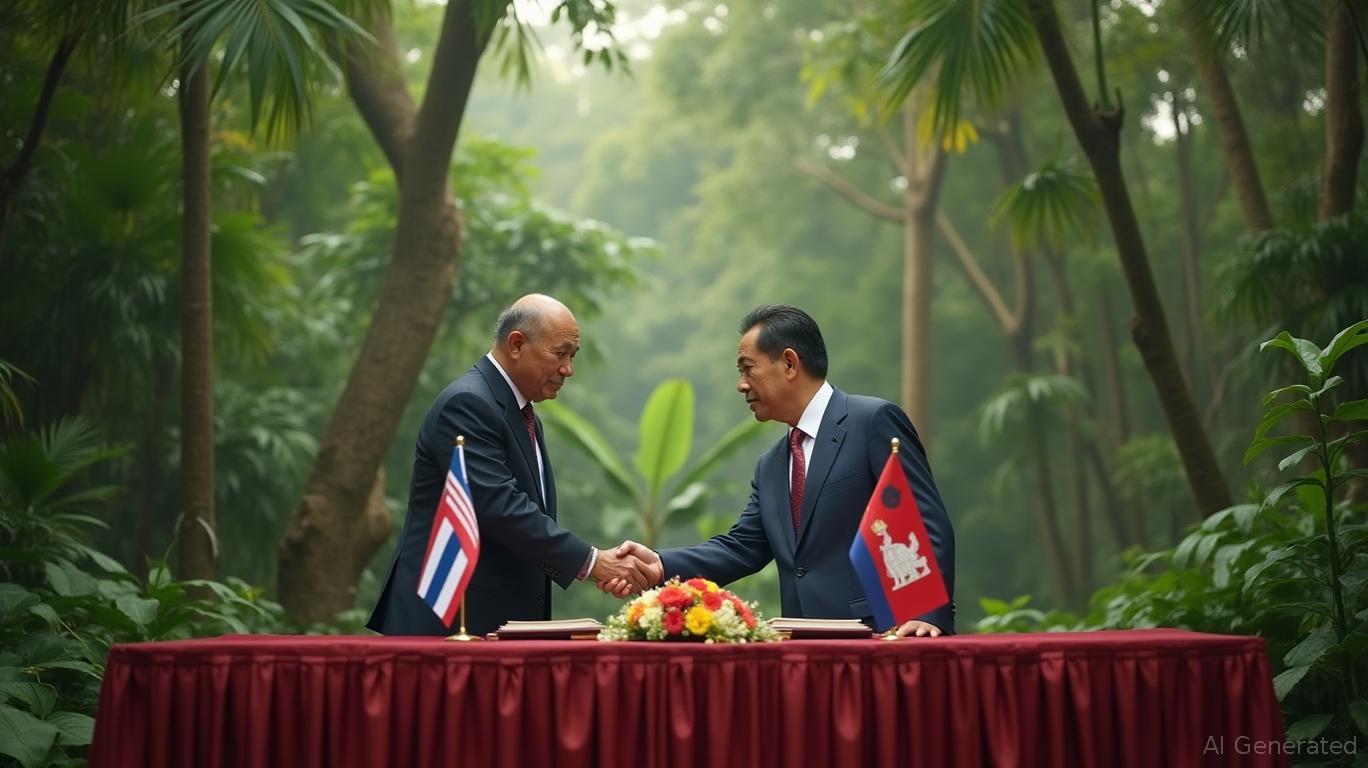U.S.-Supported Thailand-Cambodia Accord: A Strategic Geopolitical Maneuver for Stability in Southeast Asia
- Thailand and Cambodia near historic peace deal, backed by U.S., to end border clashes with weapon withdrawals and joint de-mining. - U.S. involvement highlights regional influence amid China’s growing presence, with Trump set to witness the October 25 signing. - Thailand unveils $150M tourism stimulus to boost domestic travel, balancing fiscal prudence with growth targets. - China-U.S. trade talks in Malaysia aim to ease tensions over tariffs, with both sides addressing trade barriers and rare-earth expo
Thailand and Cambodia are close to reaching a landmark peace deal aimed at ending months of violent border disputes, with U.S. President Donald Trump expected to attend the signing ceremony during the ASEAN summit in Kuala Lumpur. Thai Defense Minister Natthaphon Narkphanit noted that the negotiations have made "substantial headway," as both countries have agreed to pull back heavy weaponry from contested areas, begin collaborative landmine clearance, and form a joint task force to combat cybercrime. The agreement, anticipated to be formalized on October 25, represents a major advance for stability in Southeast Asia, a region long challenged by territorial conflicts and political friction, according to
This accord unfolds against a backdrop of shifting geopolitics, with the U.S. aiming to bolster its regional role as China’s influence expands. American mediation in the July ceasefire and the participation of U.S. observers in ongoing discussions highlight the deal’s strategic weight. Cambodia’s Deputy Prime Minister Tea Seiha stressed the importance of "reciprocal trust and assurance" throughout the talks, which also involve the release of 18 Cambodian soldiers held in detention,

Separately, Thailand’s tourism industry is poised to benefit from a 150 million dollar stimulus initiative designed to encourage local travel and aid economic revival. The government has introduced tax breaks for both individuals and companies, with special incentives for visiting less-traveled provinces and organizing business events. Finance Permanent Secretary Lavaron Sangsnit explained that these policies are intended to spur spending before the peak tourism season, potentially boosting GDP growth by 0.04%. However, the plan is expected to reduce tax income by about 5 billion baht, illustrating the challenge of balancing fiscal responsibility with economic support, as reported by
At the same time, American and Chinese representatives are preparing for trade discussions in Malaysia, aiming to ease tensions heightened by Trump’s recent tariff threats on Chinese imports. The Chinese delegation, led by Vice Premier He Lifeng, will address topics such as rare-earth exports and trade restrictions,
The intersection of these events underscores the shifting economic and political environment in Southeast Asia. Thailand’s internal reforms and diplomatic initiatives are in step with broader U.S. and Chinese efforts to influence trade and security in the region. As ASEAN leaders convene in Kuala Lumpur, the outcomes of the Thailand-Cambodia peace agreement and the China-U.S. trade talks may set important examples for future regional cooperation amid intensifying strategic rivalry.
Disclaimer: The content of this article solely reflects the author's opinion and does not represent the platform in any capacity. This article is not intended to serve as a reference for making investment decisions.
You may also like
ALGO - Down 44.96% Over the Past Year as Market Fluctuates and Results Vary
- On Oct 28, 2025, ALGO fell 0.86% in 24 hours to $0.1843, contrasting with a 1.49% weekly gain but a 44.96% annual drop. - The decline reflects macroeconomic pressures, regulatory scrutiny, and sector-wide volatility, undermining investor confidence. - Technical analysis shows range-bound trading, with investors awaiting catalysts to break the consolidation phase. - Mixed fundamentals and structural challenges persist, as the asset struggles to regain stability amid shifting market dynamics.
$2.7 Trillion Wiped from Gold — Is Liquidity About to Flood into Bitcoin?
PunkVerse: A Capital Signal Behind the Global Rise of Experience Assetization

Bitcoin Updates: Rising Global Tensions Disrupt Bitcoin’s ‘Uptober’ Momentum as $100K Level Challenges Bullish Strength
- Bitcoin fell below $113,000 in October 2025 amid U.S.-China trade tensions and macroeconomic risks, defying its historical "Uptober" trend. - Record $19B in liquidations and 52% probability of breaching $100,000 highlight volatility, though $3.55B ETF inflows and corporate holdings growth signal institutional confidence. - BTC rebounded to $115,041 as trade tensions eased, with Standard Chartered's Geoffrey Kendrick suggesting $100,000 support may hold if macroeconomic conditions improve. - Mixed technic
